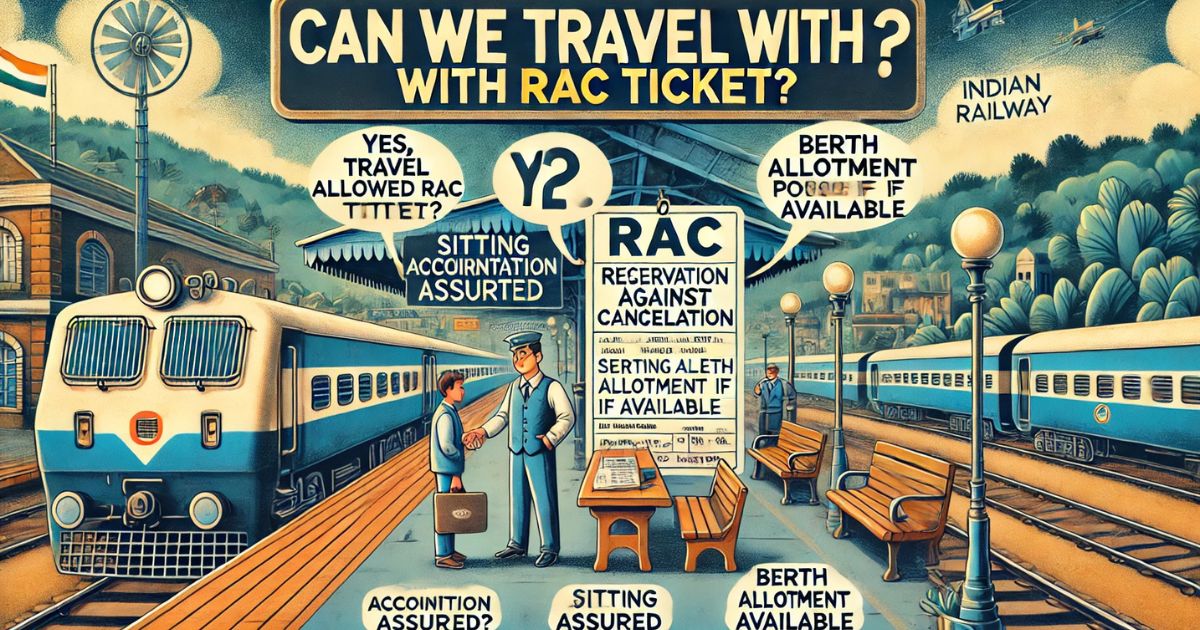In the vast and intricate network of Indian Railways, understanding ticket statuses is crucial for a smooth journey. One such status that often raises questions is the Reservation Against Cancellation (RAC) ticket. This article delves deep into the nuances of RAC tickets, addressing common concerns and providing clarity for travelers.
Understanding RAC Tickets
A Reservation Against Cancellation (RAC) ticket is issued when all confirmed seats on a train are booked. Unlike a waitlisted ticket, an RAC ticket guarantees the passenger the right to board the train and provides a seat, albeit not a full berth. Specifically, two RAC passengers share a single berth, each having a seat during the journey.
Traveling with an RAC Ticket
Boarding the Train
Yes, passengers with an RAC ticket are permitted to board the train. The Indian Railways ensures that RAC ticket holders have a seat, even if it’s shared. This provision is particularly beneficial during peak travel seasons when confirmed tickets are scarce.
Seat Allocation
Typically, RAC passengers are assigned side lower berths, which are converted into two seats. Each RAC passenger occupies one seat, sharing the berth with another RAC ticket holder. This arrangement continues unless the RAC ticket gets upgraded to a confirmed berth.
Upgrading from RAC to Confirmed Berth
Before Chart Preparation
The final reservation chart is usually prepared a few hours before the train’s departure. During this time, if there are cancellations or unsold quotas, RAC tickets may get upgraded to confirmed berths. Passengers can check their ticket status using their PNR number on official platforms like the IRCTC website or mobile apps.
After Boarding
Even after boarding, there’s a possibility of an upgrade. If confirmed passengers fail to show up, the Train Ticket Examiner (TTE) may allocate their berths to RAC passengers. It’s advisable to communicate with the TTE upon boarding to inquire about potential upgrades.
Advantages of RAC Tickets
- Guaranteed Travel: Unlike waitlisted tickets, RAC tickets ensure that passengers can board the train and have a seat.
- Potential for Upgrade: There’s a significant chance that RAC tickets get upgraded to confirmed berths, especially in cases of cancellations.
- Flexibility: RAC tickets provide an option for passengers who need to travel urgently and can’t secure a confirmed ticket.
Challenges with RAC Tickets
- Shared Seating: Sharing a berth can be uncomfortable, especially during overnight journeys.
- Uncertainty: There’s no guarantee of an upgrade, which might be inconvenient for some travelers.
- Limited Privacy: Sharing space with another passenger may compromise personal space and privacy.
Tips for RAC Ticket Holders
- Regularly Check PNR Status: Monitoring your ticket status can provide updates on potential upgrades.
- Arrive Early: Being early allows you to settle in and communicate with the TTE regarding possible berth allocations.
- Carry Essentials: Since seating arrangements might be shared, having essentials like a travel pillow or blanket can enhance comfort.
- Stay Informed: Familiarize yourself with Indian Railways’ policies regarding RAC tickets to make informed decisions.
Conclusion
Traveling with an RAC ticket in Indian Railways is both permissible and common. While it comes with certain limitations, such as shared seating, it offers a viable option for passengers during high-demand periods. By understanding the intricacies of RAC tickets and staying proactive, travelers can navigate their journeys with confidence and ease.



